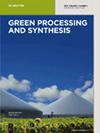Biofabrication of silver nanoparticles using Uncaria tomentosa L.: Insight into characterization, antibacterial activities combined with antibiotics, and effect on Triticum aestivum germination
IF 3.8
4区 工程技术
Q2 CHEMISTRY, MULTIDISCIPLINARY
引用次数: 0
Abstract
Herein, we used the aqueous extract of Uncaria tomentosa L. barks (Cat’s claw bark [CCb]) for the biofabrication of silver nanoparticles (CCb-Ag-NPs). The effects of different parameters (Uncaria tomentosa L. aqueous extract, silver nitrate [AgNO3] ratio, temperature, and pH) on the formation of the nanoparticles were investigated using UV scan as a preliminary tool for the detection of surface plasmon resonance of CCb-Ag-NPs. The optimal ratio was 1:7 (Uncaria tomentosa L. extract: 1 mM AgNO3 solution). Fourier-transform infrared spectroscopy revealed the functional groups of both CCb extract and the CCb-Ag-NPs, whose dispersion and quasispherical morphologies were characterized using scanning electron microscopy and transmission electron microscopy. Particle sizes ranged from 19.2 to 38.5 nm. The zeta potential of CCb-Ag-NPs was −34.44 mV. According to energy-dispersive X-ray analysis, the CCb-Ag-NPs contained 28.87% silver. The formation of Ag-NPs was also confirmed by X-ray diffraction pattern analysis. Pristine CCb-Ag-NPs showed antibacterial activity against three pathogenic bacterial strains: Escherichia coli (ATCC 25922), E. coli (ATCC 8739), and Pseudomonas aeruginosa (ATCC 90274). Antibacterial activity increased significantly after loading CCb-Ag-NPs on antibiotic discs containing meropenem and cefoxitin. Low concentrations of CCb-Ag-NPs also enhanced the germination percentage, coleoptile length, and radical root length of Triticum aestivum.利用云杉生物制造银纳米粒子:深入了解其特性、与抗生素结合的抗菌活性以及对小麦发芽的影响
在此,我们利用猫爪草树皮(Uncaria tomentosa L. barks [CCb])的水提取物进行银纳米粒子(CCb-Ag-NPs)的生物制造。利用紫外线扫描作为检测 CCb-Ag-NPs 表面等离子体共振的初步工具,研究了不同参数(猫爪树树皮水提取物、硝酸银 [AgNO3] 比例、温度和 pH 值)对纳米粒子形成的影响。最佳比例为 1:7(Uncaria tomentosa L. 提取物:1 mM AgNO3 溶液)。扫描电子显微镜和透射电子显微镜表征了CCb提取物和CCb-Ag-NPs的分散性和准球形形态。颗粒大小为 19.2 至 38.5 nm。CCb-Ag-NPs 的 zeta 电位为 -34.44 mV。根据能量色散 X 射线分析,CCb-Ag-NPs 含有 28.87% 的银。X 射线衍射图样分析也证实了 Ag-NPs 的形成。纯净的 CCb-Ag-NPs 对三种致病细菌菌株具有抗菌活性:大肠杆菌(ATCC 25922)、大肠杆菌(ATCC 8739)和铜绿假单胞菌(ATCC 90274)。在含有美罗培南和头孢西丁的抗生素圆片上添加 CCb-Ag-NPs 后,抗菌活性明显提高。低浓度的 CCb-Ag-NPs 还能提高小麦的发芽率、叶柄长度和根茎长度。
本文章由计算机程序翻译,如有差异,请以英文原文为准。
求助全文
约1分钟内获得全文
求助全文
来源期刊

Green Processing and Synthesis
CHEMISTRY, MULTIDISCIPLINARY-ENGINEERING, CHEMICAL
CiteScore
6.70
自引率
9.30%
发文量
78
审稿时长
7 weeks
期刊介绍:
Green Processing and Synthesis is a bimonthly, peer-reviewed journal that provides up-to-date research both on fundamental as well as applied aspects of innovative green process development and chemical synthesis, giving an appropriate share to industrial views. The contributions are cutting edge, high-impact, authoritative, and provide both pros and cons of potential technologies. Green Processing and Synthesis provides a platform for scientists and engineers, especially chemists and chemical engineers, but is also open for interdisciplinary research from other areas such as physics, materials science, or catalysis.
 求助内容:
求助内容: 应助结果提醒方式:
应助结果提醒方式:


